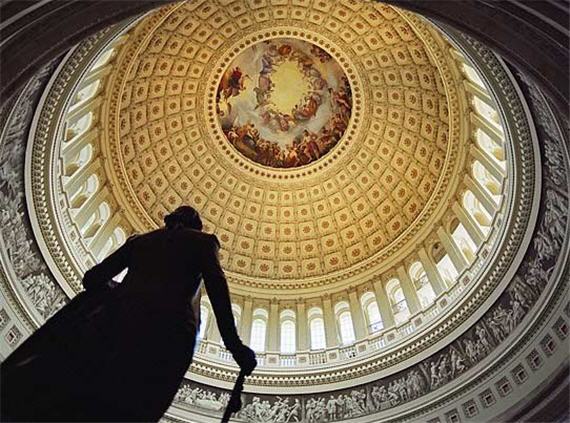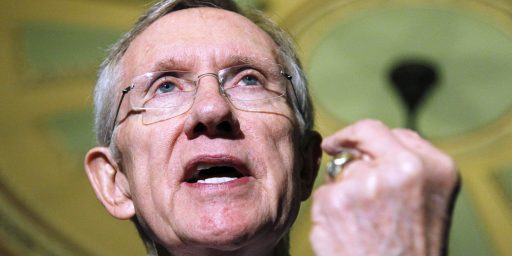Reid Plan Altered In Effort To Gain GOP Support
Harry Reid is making some rather important changes to his debt ceiling plan in an effort to attract Republican votes in the Senate:
Senate Majority Leader Harry Reid (D-Nev.) has revised his plan to raise the debt limit in a last-ditch bid to attract Republican support.
The biggest change is that Reid would give the president almost unilateral power to raise the debt limit, borrowing an idea introduced by Senate Republican Leader Mitch McConnell (R-Ky.).
Reid would have President Obama request a $2.4 trillion debt-limit increase in two installments of $1.2 trillion each. The requests would be subject to congressional resolutions of disapproval, but these would do little to restrict the president.
Obama could veto any resolution of disapproval, and it would take a two-thirds vote in both chambers of Congress to override him.
According to a Senate Democratic aide, Reid also increased the total level of spending cuts from $2.2 trillion to $2.4 trillion, in part by using the January baseline — a budget maneuver House Speaker John Boehner (R-Ohio) used on a previous version of his debt-limit plan. The January budget baseline does not count cuts Congress implemented in legislation passed this spring to avert a government shutdown.
So far Reid has had trouble attracting Republicans to his bill. Centrist Republican Sen. Scott Brown (Mass.) said he would vote for it, but otherwise it has received scant bipartisan support.
So basically what we’ve got here is the original McConnell-Reid Plan grafted onto Reid’s bill, with the appearance of more spending cuts thanks in part to an accounting trick. That doesn’t sound to me like the kind of bill likely to garner significant Republican support either in the Senate or the House. However, it may be that there will be enough GOP Senators like Brown who simply desire to resolve this matter that they’d be willing to support Reid’s bill.There’s also a rumor that Reid may be willing to agree to a Senate debate and vote on a Balanced Budget Amendment, which I think is probably all but inevitable at this point.
There’s another potential problem for Republicans in the Reid Plan, though. Even though it doesn’t really mention taxes at all, it could lead to tax increases down the road:
Senate Majority Leader Harry Reid has said that his debt ceiling bill, in a bow to Republicans, includes no tax increases. But does it really?
An analysis from the Republican Senate Budget Committee staff shows that Reid’s bill includes gimmicks that, if passed, would account for approximately $3.8 trillion in revenue — or tax increases.
The maneuvering is complicated; but when explained properly, it becomes clear.
Reid’s proposal includes a provision that “deems” budget resolutions for fiscal years 2012 and 2013, but Senate Democrats have not yet produced a 2012 budget proposal, much less one for 2013.
Within those anticipated budget resolutions lie the tax increases, according to the analysis, and here is where it gets tricky.
When the Congressional Budget Office scores a proposal, it uses either current policy or current law as its baseline. Reid’s bill is based on current law, which assumes certain tax breaks will expire according to pre-determined scheduled. That is a big deal.
The 2001-2003 Bush tax cuts are set to expire at the end of 2012. And some business tax breaks, “death tax” cuts, and the patch for the Alternative Minimum Tax expire at the end of 2011. Reid’s proposal assumes that Congress will not act to renew or extend those expiring tax breaks.
(…)
All told, the expired tax cuts would cost $3.8 trillion
If not addressed, this could be a serious problem for the plan in the Senate, and in the House.
A version of Reid’s bill will be voted on by the House this afternoon in a symbolic move. It will be defeated on a party-line vote most likely. The real Reid Plan will it its first test around 1:00am Sunday morning when the Senate holds its first cloture vote. Reid will need at least 60 votes, but he’s hoping for more than that as a sign to the House that the plan has broad bipartisan support in the Senate. I’m not at all sure he will get what he wants.






